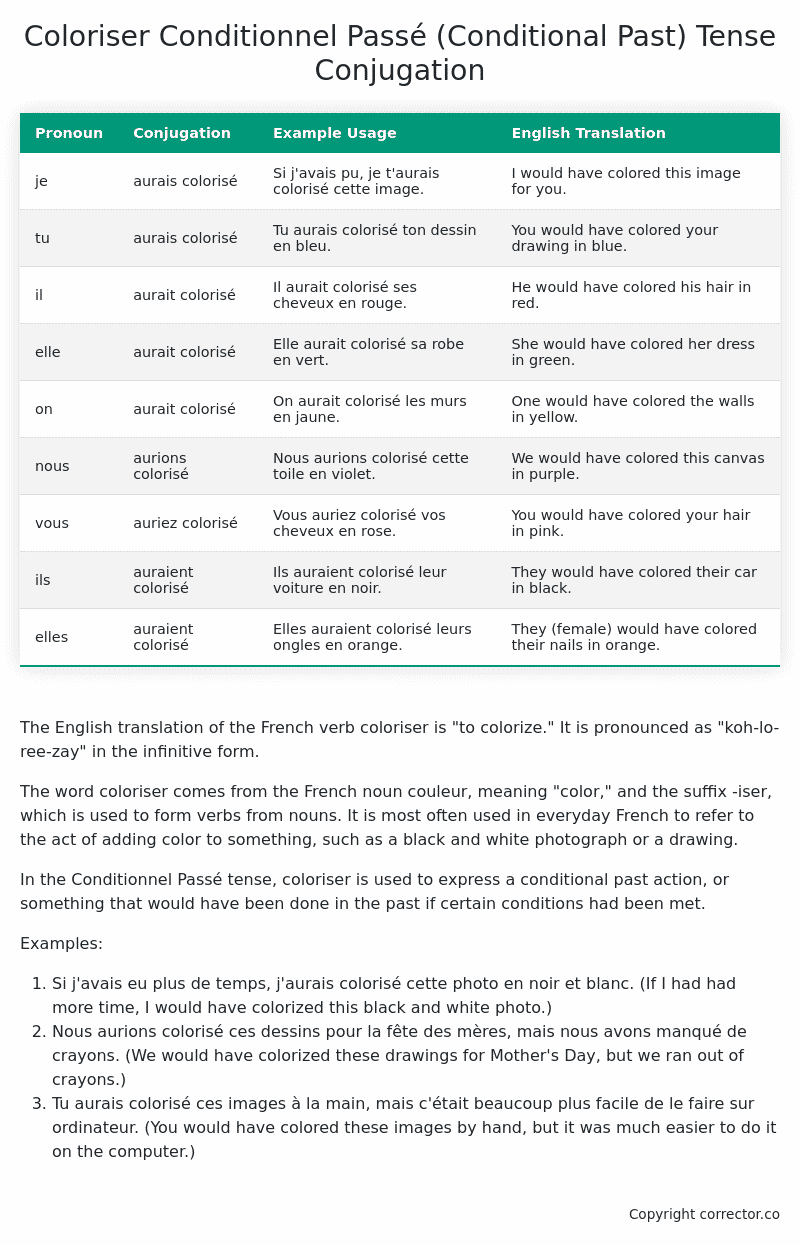Conditionnel Passé (Conditional Past) Tense Conjugation of the French Verb coloriser
Introduction to the verb coloriser
The English translation of the French verb coloriser is “to colorize.” It is pronounced as “koh-lo-ree-zay” in the infinitive form.
The word coloriser comes from the French noun couleur, meaning “color,” and the suffix -iser, which is used to form verbs from nouns. It is most often used in everyday French to refer to the act of adding color to something, such as a black and white photograph or a drawing.
In the Conditionnel Passé tense, coloriser is used to express a conditional past action, or something that would have been done in the past if certain conditions had been met.
Examples:
- Si j’avais eu plus de temps, j’aurais colorisé cette photo en noir et blanc. (If I had had more time, I would have colorized this black and white photo.)
- Nous aurions colorisé ces dessins pour la fête des mères, mais nous avons manqué de crayons. (We would have colorized these drawings for Mother’s Day, but we ran out of crayons.)
- Tu aurais colorisé ces images à la main, mais c’était beaucoup plus facile de le faire sur ordinateur. (You would have colored these images by hand, but it was much easier to do it on the computer.)
Table of the Conditionnel Passé (Conditional Past) Tense Conjugation of coloriser
| Pronoun | Conjugation | Example Usage | English Translation |
|---|---|---|---|
| je | aurais colorisé | Si j’avais pu, je t’aurais colorisé cette image. | I would have colored this image for you. |
| tu | aurais colorisé | Tu aurais colorisé ton dessin en bleu. | You would have colored your drawing in blue. |
| il | aurait colorisé | Il aurait colorisé ses cheveux en rouge. | He would have colored his hair in red. |
| elle | aurait colorisé | Elle aurait colorisé sa robe en vert. | She would have colored her dress in green. |
| on | aurait colorisé | On aurait colorisé les murs en jaune. | One would have colored the walls in yellow. |
| nous | aurions colorisé | Nous aurions colorisé cette toile en violet. | We would have colored this canvas in purple. |
| vous | auriez colorisé | Vous auriez colorisé vos cheveux en rose. | You would have colored your hair in pink. |
| ils | auraient colorisé | Ils auraient colorisé leur voiture en noir. | They would have colored their car in black. |
| elles | auraient colorisé | Elles auraient colorisé leurs ongles en orange. | They (female) would have colored their nails in orange. |
Other Conjugations for Coloriser.
Le Present (Present Tense) Conjugation of the French Verb coloriser
Imparfait (Imperfect) Tense Conjugation of the French Verb coloriser
Passé Simple (Simple Past) Tense Conjugation of the French Verb coloriser
Passé Composé (Present Perfect) Tense Conjugation of the French Verb coloriser
Futur Simple (Simple Future) Tense Conjugation of the French Verb coloriser
Futur Proche (Near Future) Tense Conjugation of the French Verb coloriser
Plus-que-parfait (Pluperfect) Tense Conjugation of the French Verb coloriser
Passé Antérieur (Past Anterior) Tense Conjugation of the French Verb coloriser
Futur Antérieur (Future Anterior) Tense Conjugation of the French Verb coloriser
Subjonctif Présent (Subjunctive Present) Tense Conjugation of the French Verb coloriser
Subjonctif Passé (Subjunctive Past) Tense Conjugation of the French Verb coloriser
Subjonctif Imparfait (Subjunctive Imperfect) Tense Conjugation of the French Verb coloriser
Subjonctif Plus-que-parfait (Subjunctive Pluperfect) Tense Conjugation of the French Verb coloriser
Conditionnel Présent (Conditional Present) Tense Conjugation of the French Verb coloriser
Conditionnel Passé (Conditional Past) Tense Conjugation of the French Verb coloriser (this article)
L’impératif Présent (Imperative Present) Tense Conjugation of the French Verb coloriser
L’infinitif Présent (Infinitive Present) Tense Conjugation of the French Verb coloriser
Struggling with French verbs or the language in general? Why not use our free French Grammar Checker – no registration required!
Get a FREE Download Study Sheet of this Conjugation 🔥
Simply right click the image below, click “save image” and get your free reference for the coloriser Conditionnel Passé tense conjugation!

Coloriser – About the French Conditionnel Passé (Conditional Past) Tense
Formation
Common Everyday Usage Patterns
Expressing Unreal Past Scenarios
Polite Requests or Suggestions
Expressing Doubt or Uncertainty
Interactions with Other Tenses
Conditional Present
Indicative Past Tenses
Conditional Future
Summary
Want More?
I hope you enjoyed this article on the verb coloriser. Still in a learning mood? Check out another TOTALLY random French verb conjugation!


